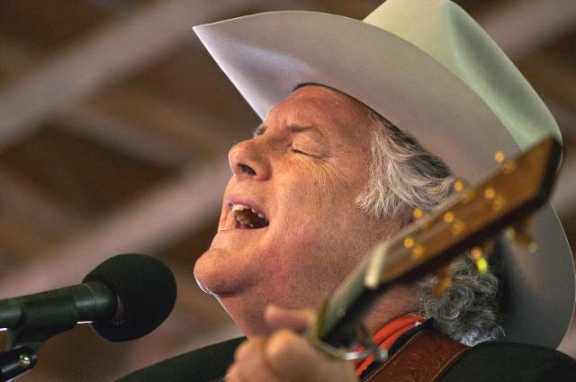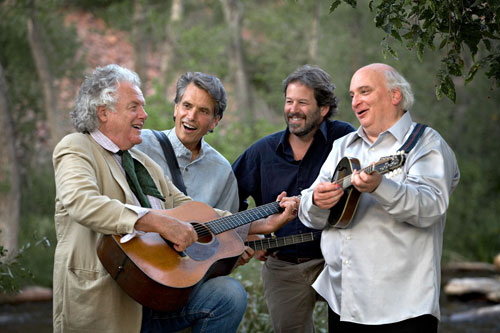Peter Rowan: For all his achievements of the past four and a half decades, he’s never been more subtly powerful or more persuasive in the utter conviction underpinning his message than on Legacy. And that’s saying something.Honoring His Inviolable Values
By David McGee
LEGACY
Peter Rowan Bluegrass Band
Compass RecordsIf any veteran bluegrass musician has earned the right to title an album Legacy, no one would argue Peter Rowan's prerogative to do so. A formidable musician and gifted songwriter, Rowan was there at the genesis of progressive bluegrass as a member of the short-lived and quite legendary Muleskinner. But well before that breakthrough moment he was learning the fundamentals of traditional bluegrass at its source—as a young member of Bill Monroe’s Bluegrass Boys, some 45 years ago. Since then he has cut a wide swath through bluegrass history, in projects with other artists (he was an essential component of the lean, mean acoustic band—with the late Roy Huskey, Jr. and Norman Blake—Steve Earle assembled for his first post-incarceration/post-rehab album, Train a-Comin’, which set the stage for a full-scale Earle career revival that continues unabated and a few Grammys later) and with a number of remarkable solo albums that swing easily to and fro from the traditional and the progressive, to the point where Rowan blurs the distinction between the schools and it’s all simply music.
Legacy is a low-key masterpiece, at once an impressive showcase for his touring Bluegrass Band (Jody Stecher, mandolin; Keith Little, banjo; Paul Knight, bass) and a reminder not only of the high caliber of musicianship Rowan brings to the table as a guitarist (no flash, only tasty, to the point leads and unflagging rhythm) but the strength of his songwriting as well. Only three of the 12 tracks lack a Rowan credit, and of the remaining nine most are credited to Rowan alone. Those are the numbers; the facts show wit, an abundance of heart and deeply felt faith informing the words Rowan and his mates sing.
Wherein one-upmanship gets its comeuppance: Peter Rowan Bluegrass Band, ‘Jailer Jailer,’ the opening cut from the band’s low-key masterpiece, Legacy, with Rowan on lead vocal, Keith Little on harmony vocal, Jody Stetcher on mandolin, Paul Knight on bass.A bit of conventional wisdom kicks off the album in the sprightly “Jailer Jailer,” in which one-upsmanship gets its comeuppance, as Rowan’s lyrics point up the folly of folks trying to best each other over everything from material possessions (“my truck is better than your truck”) to spiritual orientation (“my god is better than your god—my god does the job, your god is just odd”), in the words of a prisoner who is otherwise begging to remain incarcerated (“throw away the key”), presumably on the theory that being locked up with three hots and a cot is a better life than what awaits on the outside. Sometimes, you see, a cigar is just a smoke. This elliptical approach animates one of the finest love songs Rowan has ever penned, the easygoing beauty “Don’t Ask Me Why,” its carefree mood enhanced by Stecher’s tender, lyrical mandolin embellishments. Singing sturdily but plaintively, Rowan paints a lyrical portrait of a fellow out enjoying the wonders of the natural world as the sun makes it way to the horizon, and from this experience is reminded not only of his own beloved, but of a fundamental truth—“Oh, the heart is a muscle, got to love to live/If you want to love, you got to forgive…”—and how sometimes such feelings don’t have deeper explanations, but simply are: “You make me laugh and you make me cry/I love you baby, don’t ask me why.” Hey, sometimes a cigar is just a smoke, baby.
The Peter Rowan Bluegrass Band: (from left) Peter Rowan, Keith Little, Paul Knight, Jody Stetcher: Music, simply music.Thematically, though, Legacy is (appropriately enough) more about family than any other topic. Though its music is lively and driving, “The Family Demon” is a close harmonized chronicle of parental tough love (“you tell me to stand up and take it like a man/the crack of the whip or the back of your hand”) fueled by alcohol, the “family demon” of the title that has also taken hold of the offspring, who knows he is fated to “carry the pain of your love in my bones.” In another context Keith Little’s energetic banjo solo would seem uplifting, but here it voices the enduring ache afflicting the singer as he ages. Solemn as a hymn, “Father, Mother,” a co-write courtesy the Rowan brothers, Peter and Christopher, is a heart rending recollection of the day of the father’s burial, an occasion of prayer and reflection that concludes with the sighting of a shooting star across the heavens and the sound of “the angels singing/from Heaven way on high.” Rowan is so deep into this with his raw vocal, it’s hard not to think of the song as being autobiographical. Though not specifically about family, “The Night Prayer,” its title reflecting its hushed atmosphere (Rowan’s lone fingerpicked guitar opens the song, and Little adds a flitter of banjo fill here and there as the song unfolds), finds the wandering narrator, alone and weary, honoring his family in his nightly spiritual communion with the Almighty, remembering “that’s how my father prayed with me,” and believing his words are heard, and will save his loved ones “from my worst fears.”
‘Family Demon,’ one of the best of the family-themed songs on the Peter Rowan Bluegrass Band’s Legacy album.It figures, then, that Legacy should feature out-and-out gospel, and so it is. The foreboding “God’s Own Child,” a somber hymn of supplication, is blessed by a strong, assertive lead vocal from Rowan, and more than a little added gravitas courtesy a heartfelt verse sung by Del McCoury and harmony vocals by Ricky Skaggs, who also adds a tender mandolin solo for good measure. Keith Little takes a forceful lead vocal on Carter Stanley’s plea for heavenly salvation, “Let Me Walk Lord By Your Side,” another occasion for Stetcher to heighten the drama with a crying mandolin solo. Not the least of the gospel oriented material is Rowan’s “Turn the Other Cheek,” a bright, upbeat toe-tapper counseling patience and understanding—and the implementation of the Golden Rule—over internecine conflict incapable of pacifying “the demon of a broken home.” Hard to ignore, too, Rowan’s fleeting shout-out to his mentor, Mr. Bill, at the start of the third verse, when he begins, “Christmas time’s a-comin’…” Working with producer Alison Brown, head of Compass Records and a superior musician who knows the ins and outs of bluegrass and roots music as well as anyone, Rowan has marshaled all his strengths in service to stories clearly drawn from experience and reflective of his inviolable values. For all his achievements of the past four and a half decades, he’s never been more subtly powerful or more persuasive in the utter conviction underpinning his message than on Legacy. And that’s saying something.
The Peter Rowan Bluegrass Band’s Legacy is available at www.amazon.com
Founder/Publisher/Editor: David McGee
Contributing Editors: Billy Altman, Laura Fissinger, Christopher Hill, Derk Richardson
Logo Design: John Mendelsohn (www.johnmendelsohn.com)
Website Design: Kieran McGee (www.kieranmcgee.com)
Staff Photographers: Audrey Harrod (Louisville, KY; www.flickr.com/audreyharrod), Alicia Zappier (New York)
E-mail: thebluegrassspecial@gmail.com
Mailing Address: David McGee, 201 W. 85 St.—5B, New York, NY 10024




